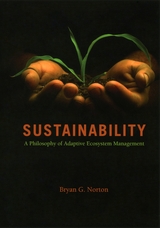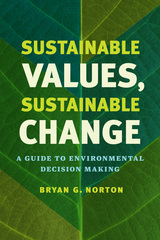3 books by Norton, Bryan G.

Sustainability
A Philosophy of Adaptive Ecosystem Management
Bryan G. Norton
University of Chicago Press, 2005
While many disciplines contribute to environmental conservation, there is little successful integration of science and social values. Arguing that the central problem in conservation is a lack of effective communication, Bryan Norton shows in Sustainability how current linguistic resources discourage any shared, multidisciplinary public deliberation over environmental goals and policy. In response, Norton develops a new, interdisciplinary approach to defining sustainability—the cornerstone of environmental policy—using philosophical and linguistic analyses to create a nonideological vocabulary that can accommodate scientific and evaluative environmental discourse.
Emphasizing cooperation and adaptation through social learning, Norton provides a practical framework that encourages an experimental approach to language clarification and problem formulation, as well as an interdisciplinary approach to creating solutions. By moving beyond the scientific arena to acknowledge the importance of public discourse, Sustainability offers an entirely novel approach to environmentalism.
Emphasizing cooperation and adaptation through social learning, Norton provides a practical framework that encourages an experimental approach to language clarification and problem formulation, as well as an interdisciplinary approach to creating solutions. By moving beyond the scientific arena to acknowledge the importance of public discourse, Sustainability offers an entirely novel approach to environmentalism.
[more]

Sustainable Values, Sustainable Change
A Guide to Environmental Decision Making
Bryan G. Norton
University of Chicago Press, 2015
Sustainability is a nearly ubiquitous concept today, but can we ever imagine what it would be like for humans to live sustainably on the earth? No, says Bryan G. Norton in Sustainable Values, Sustainable Change. One of the most trafficked terms in the press, on university campuses, and in the corridors of government, sustainability has risen to prominence as a buzzword before the many parties laying claim to it have come close to agreeing how to define it. But the term’s political currency urgently demands that we develop an understanding of this elusive concept.
While economists, philosophers, and ecologists argue about what in nature is valuable, and why, Norton here offers an action-oriented, pragmatic response to the disconnect between public and academic discourse around sustainability. Looking to the arenas in which decisions are made—and the problems that are driving these decisions—Norton reveals that the path to sustainability cannot be guided by fixed, utopian objectives projected into the future; sustainability will instead be achieved through experimentation, incremental learning, and adaptive management. Drawing inspiration from Aldo Leopold’s famed metaphor of “thinking like a mountain” for a spatially explicit, pluralistic approach to evaluating environmental change, Norton replaces theory-dependent definitions with a new decision-making process guided by deliberation and negotiation across science and philosophy, encompassing all stakeholders and activists and seeking to protect as many values as possible. Looking across scales to today’s global problems, Norton urges us to learn to think like a planet.
While economists, philosophers, and ecologists argue about what in nature is valuable, and why, Norton here offers an action-oriented, pragmatic response to the disconnect between public and academic discourse around sustainability. Looking to the arenas in which decisions are made—and the problems that are driving these decisions—Norton reveals that the path to sustainability cannot be guided by fixed, utopian objectives projected into the future; sustainability will instead be achieved through experimentation, incremental learning, and adaptive management. Drawing inspiration from Aldo Leopold’s famed metaphor of “thinking like a mountain” for a spatially explicit, pluralistic approach to evaluating environmental change, Norton replaces theory-dependent definitions with a new decision-making process guided by deliberation and negotiation across science and philosophy, encompassing all stakeholders and activists and seeking to protect as many values as possible. Looking across scales to today’s global problems, Norton urges us to learn to think like a planet.
[more]

Wolves and Human Communities
Biology, Politics, and Ethics
Edited by Virginia A. Sharpe, Bryan Norton, and Strachan Donnelley
Island Press, 2000
Like wolf restoration activities in the West, the proposal to reintroduce wolves into the Adirondacks has generated intense public debate. The idea of returning top predators to settled landscapes raises complicated questions on issues ranging from property rights to wildlife management to obligations to present and future generations.Wolves and Human Communities brings together leading thinkers and writers from diverse fields -- including Timothy Clark, Daniel Kemmis, L. David Mech, Mary Midgley, Ernest Partridge, Steward T.A. Pickett, Joseph Sax, Rodger Schlickeisen, and others -- to address the complex ethical, biological, legal, and political concerns surrounding wolf reintroduction. Contributors specifically explore the social, cultural, and ecological values that come into play in the debate, as they examine: the views of stakeholders in the Adirondack decision historical trends in public perception of restoration the legal and policy context for species preservation, and the challenges to the current system of property law biological and political lessons learned from Yellowstone, Isle Royale, and the Great Lakes states the meaning of wildness, both in ourselves and the wolf The final chapter by Niles Eldredge takes the point of view of evolutionary time and ecological scale, challenging us to develop a new consciousness regarding our position in the natural world.Wolves and Human Communities offers a thought-provoking examination of interactions between human and wild communities, and represents an important contribution to debates over species reintroduction for policymakers, researchers, ecologists, sociologists, lawyers, ethicists, philosophers, and local residents.
[more]
READERS
Browse our collection.
PUBLISHERS
See BiblioVault's publisher services.
STUDENT SERVICES
Files for college accessibility offices.
UChicago Accessibility Resources
home | accessibility | search | about | contact us
BiblioVault ® 2001 - 2024
The University of Chicago Press









